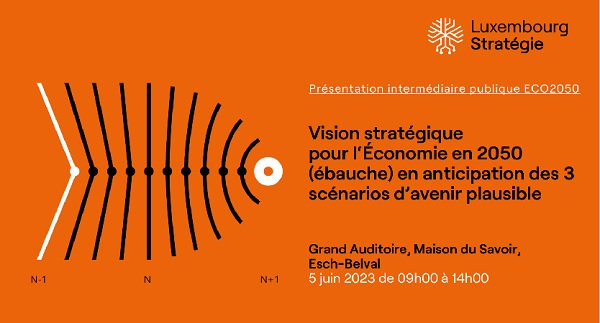
Last week, the strategic foresight department of Luxembourg's Ministry of the Economy presented publicly the draft ECO2050 strategic vision developed by Luxembourg Strategy.
The ECO2050 vision aims to support the development of a resilient, competitive and inclusive economy in the decades to come. In preparation for more than a year, with the help of a technical working group involving an inter-ministerial committee, a public campaign, business leaders, elected officials and municipal officials, forecasting experts and scientific partners, this vision also aims to prepare the economy for the success of several transitions (energy, societal, ecological, etc.) and to guarantee the well-being of all. It integrates existing economic strategies and responds to challenges and opportunities detected through plausible future scenarios to define a desirable economy.
The vision is structured in 10 strategic pillars which are intended to be advantageous whatever the scenario or the elements of the scenario which are carried out, with three plausible future scenarios as a result:
- Improve open strategic autonomy to renew national production: an economy less dependent on imports and shocks on international markets and strong national production are assets;
- Apply circularity and sobriety to the whole economy and to society: circularity and sobriety contribute to more autonomy in production and consumption, as well as to decarbonisation and efficiency in the use of resources;
- Placing young people and knowledge at the heart of the economy: societal and organisational innovation can be a lever to develop the creation of activity, employment, social cohesion and to meet new social needs;
- Reconciling digital, ecological and social transitions: if digital technologies can facilitate the emergence of a more sustainable future, they also have a significant environmental footprint and shape our social relations;
- Invest in critical redundancy, strategic storage and lifesaving solutions: for the economy to be more resilient to shocks and recover faster from disruptions, there is a need to build reserves and protect essential goods and services;
- Simplify procedures, shorten paths, facilitate transfers: improve the professional environment for entrepreneurs, investors and researchers by simplifying procedures, to invigorate the corporate culture and attract talent;
- Adapt the health system to new challenges, an economic opportunity: it is necessary to anticipate new pandemics and new disease vectors and to use the digital transition to reduce costs and increase the quality of care;
- Adopt an integrated strategy of sustainable economic diplomacy: forge strong diplomatic and commercial ties with other countries that share the same values as us, to better succeed in the multiple transitions;
- Ensuring sustainable and solid public finances: in a context of multiple transitions requiring major investments, long-term programming of public finances is essential;
- Turning anticipation into a comparative economic advantage: anticipation and an early warning system make it possible to identify vulnerabilities and opportunities in advance. They also reduce transition costs.
With real-time polls, a discussion panel and a round table with Franz Fayot, Luxembourg's Minister for the Economy and Minister for Cooperation and Humanitarian Action, Claude Haagen, Minister for Agriculture, Viticulture and Rural Development, and Minister of Social Security, and Joëlle Welfring, Minister of the Environment, Climate and Sustainable Development, the presentation thus enabled enriching exchanges with the nearly 250 people present.
Anyone interested is invited to express their comments on the vision by e-mail: luxstrategie@eco.etat.lu until 1 July 2023 in view of the final presentation of the ECO2050 Vision which will take place on 26 September 2023, at the House of Knowledge in Esch-Belval.








